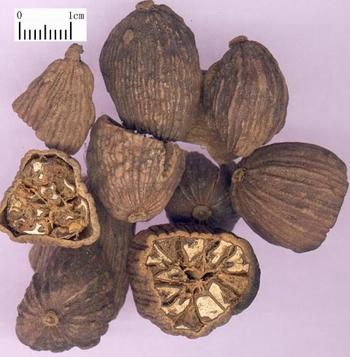Cao Guo
The Processing of Cao Guo
Origin
The mature fruit of Amomum tsao-ko Crevost et Lemaire of family Zingiberaceae.
Location
Yunnan, Guangxi and Guizhou provinces, etc.in China.
Harvest
Collected in autumn when the fruits are ripe.
The true smell and taste
Specially fragrant, pungent, slight bitter.
Best quality
Dry, big, full, red-brownish surface, strongly fragrant.
Processing
Dried in sun or in lower temperature, unprocessed, broken when used.
The Effect of Cao Guo
Property
Pungent, warm; spleen and stomach meridians entered.
Actions
Dry dampness and warm middle energizer, dispel phlegm and check malaria.
Indications
A. Syndrome of obstruction of cold-damp in middle energizer
It is drastically pungent, warm in property and strong in smell. It is the essential herb for the syndrome of obstruction of cold-damp in spleen-stomach for its strong actions of drying dampness and warming middle energizer. For gastric and abdominal cold pain, vomiting, hiccup and turbid-greasy tongue coating due to preponderance of cold-damp, it is usually combined with the middle-energizer-warming and vomiting-arresting herbs such as Wu Zhu Yu, Gan Jiang, Sha Ren and Ban Xia. It also can be used for diarrhea due to obstruction of cold-damp in middle energizer.
B. Malaria
It can remove turbidity with fragrance, warm spleen and dry dampness, dispel phlegm and check malaria. It is suitable for malaria due to cold-damp preponderance or cold-phlegm accumulation in middle energizer. For high fever with chills, it is usually combined with Chang Shan and Bing Lang. For malaria of preponderance of heat over cold, it is usually combined with Chai Hu and Huang Qin. For malaria of preponderance of cold over heat, it is usually combined with Fu Zi and Sheng Jiang.
Dosage and Administrations
Decoct 3~6 g.
